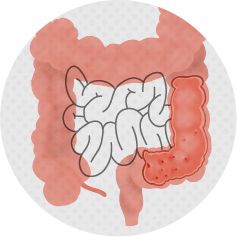People may experience fever as a symptom of UC or as a complication of the condition. A person should consult a gastroenterologist to determine the possible cause and a suitable treatment plan.
UC is a type of inflammatory bowel disease (IBD) that usually causes gastrointestinal symptoms. However, people may also have symptoms that affect other body parts and experience more generalized symptoms, such as fever and chills.
This article explores the link between UC and fever. It also discusses how to treat fever and when to consult a doctor.

Fever is the body’s typical response to infection and inflammation. Evidence notes that feeling feverish is one of the more common symptoms of UC.
Experts commonly associate fever with severe UC and the possible complications that may arise. However, some people with a mild case of the condition may still experience fever as a symptom.
UC symptoms
UC is a lifelong condition that causes inflammation of the large intestine. It commonly begins in the rectum and spreads upward to the colon.
Many people with IBD may experience fever as one of the symptoms, which often start gradually.
A person will likely experience alternating periods of remission, during which they have few or no symptoms, and flare-ups, when the disease is active.
Some of the main symptoms
- bloody diarrhea
- the urgency to pass stool
- abdominal pain
- malaise
- unexplained weight loss
- fever
Severe colitis
Fever is
- more than six bloody stools daily
- tachycardia
- anemia
- elevated erythrocyte sedimentation rate
Fulminant colitis
Fulminant colitis is a subtype of severe UC that produces signs of increased toxicity, including fever and unintentional weight loss. The condition can also
- more than 10 stools per day
- abdominal pain
- distension
- continuous bleeding
Toxic megacolon
Fever can also indicate the presence of complications. One common complication associated with fulminant colitis is toxic megacolon. This condition involves the large intestine losing muscle tone within days to hours, causing it to expand. This may cause a high fever and abdominal pain.
Other causes
A person may also develop a fever as a side effect of taking medications that treat UC, such as vedolizumab.
Sometimes, UC can also be the
People should speak with a doctor to determine what may be causing their symptoms.
The treatment of UC depends on the extent and severity of the disease. The first-line treatment is anti-inflammatory medications, such as sulfasalazine and 5-aminosalicylates.
Gastroenterologists may also add immunosuppressants such as azathioprine and cyclosporine if a person does not respond to their initial treatment.
If a person’s fever results from fulminant colitis or toxic megacolon, they will require hospitalization. In the hospital, they will receive IV fluids and electrolytes. Doctors administer these medications directly into the bloodstream.
The doctor may recommend bowel rest and also give high dose IV corticosteroids, anti-tumor necrosis factor (anti-TNF), or cyclosporine if they suspect a severe infection. This may be alongside antibiotics or infliximab, depending on a person’s response to the drugs. They may also require ICU consultation and medication to help maintain their blood pressure.
A doctor may also recommend bowel rest, which requires a person to refrain from eating food by mouth. This gives the digestive system time to heal. A person may have a nasogastric tube fitted to help decompress the stomach.
A person may need surgery in severe cases or if the symptoms do not improve within 24–48 hours. Doctors may recommend a subtotal colectomy with ileostomy and one of the below:
- a Hartmann pouch
- rectostomy
- sigmoidostomy
Read on to learn more about surgery for UC.
A person should consult a doctor immediately if they are experiencing:
- new or increased bleeding
- constant abdominal pain
- a high, persistent fever
- symptoms that persist or worsen
- new symptoms
Some FAQs about UC and fever may include:
Can you get a fever with ulcerative colitis?
Yes, a person can experience a fever due to UC. UC is an inflammatory condition and fever is a common way the body may respond to inflammation. Fever is one of the main symptoms of UC and health experts commonly associate it with severe UC.
What does an ulcerative colitis flare-up feel like?
A UC flare-up describes when symptoms return after not experiencing any for a period of time. Symptoms may vary from person to person, but typically involve belly pain and cramping, rectal pain and bleeding, urgent bowel movements, diarrhea, and fatigue.
When should you go to the ER for ulcerative colitis?
It is advisable for a person to seek immediate medical attention if they are experience worsening symptoms. These may include high fever, severe stomach pain, severe diarrhea, and heavy rectal bleeding. A trip to the ER can help minimize the risk of severe dehydration or other potentially severe complications.
Read on to learn more about UC and hospitalization.
How bad can ulcerative colitis get?
While a person is unlikely to die from the condition itself, life threatening complications can sometimes arise. This can include septic shock or toxic megacolon. Without treatment and managing the condition, UC can also lead to severe health problems, such as anemia, osteoporosis, joint pain, skin cancer, and colon cancer.
These can include inflammation in other parts of the body, osteoporosis, and poor growth and development. Untreated UC can also lead to other gastrointestinal problems, such as toxic megacolon and bowel cancer.
Read on to learn more about the complications of moderate to severe ulcerative colitis.
Fever is the body’s response to inflammation. As UC is a type of IBD, this may be one of the symptoms a person experiences as part of the body’s inflammatory response.
However, doctors more often associate it with severe or more extensive UC. It may also be a side effect of medications or other associated complications.
A person with UC who experiences high or persistent fever with or without other symptoms should contact a doctor for a prompt diagnosis and treatment.

